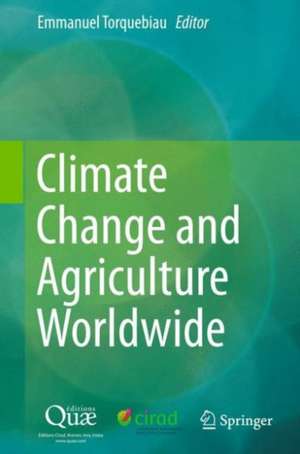Climate Change and Agriculture Worldwide
Editat de Emmanuel Torquebiauen Limba Engleză Hardback – noi 2015
How can food security be achieved while adapting to and mitigating climate change? What are the main threats to agriculture in developing countries? How do farmers in these countries cope with the threats? What does agricultural research propose? What options have yet to be investigated?
A broad scope of scientific research is underway to address these challenges. Diverse solutions are available, including new agricultural practices, water management, agricultural waste recycling, diagnosis of emerging diseases, payment for ecosystem services, etc. Gaining insight into the financial and political mechanisms that underlie international climate negotiations is also essential to design practical ways to deal with climate issues and meet sustainable development requirements in collaboration with farmers. This book pools the wealth of experience of dozens of researchers and
development officers from a range of disciplines. We have focused on making it detailed, accurate and hopefully easy to read for researchers, students and all other informed readers.
| Toate formatele și edițiile | Preț | Express |
|---|---|---|
| Paperback (1) | 1111.67 lei 6-8 săpt. | |
| SPRINGER NETHERLANDS – 23 aug 2016 | 1111.67 lei 6-8 săpt. | |
| Hardback (1) | 1123.67 lei 3-5 săpt. | |
| SPRINGER NETHERLANDS – noi 2015 | 1123.67 lei 3-5 săpt. |
Preț: 1123.67 lei
Preț vechi: 1370.32 lei
-18% Nou
Puncte Express: 1686
Preț estimativ în valută:
215.00€ • 224.51$ • 177.55£
215.00€ • 224.51$ • 177.55£
Carte disponibilă
Livrare economică 25 martie-08 aprilie
Preluare comenzi: 021 569.72.76
Specificații
ISBN-13: 9789401774604
ISBN-10: 9401774609
Pagini: 348
Ilustrații: XXV, 348 p.
Dimensiuni: 155 x 235 x 27 mm
Greutate: 0.87 kg
Ediția:1st ed. 2016
Editura: SPRINGER NETHERLANDS
Colecția Springer
Locul publicării:Dordrecht, Netherlands
ISBN-10: 9401774609
Pagini: 348
Ilustrații: XXV, 348 p.
Dimensiuni: 155 x 235 x 27 mm
Greutate: 0.87 kg
Ediția:1st ed. 2016
Editura: SPRINGER NETHERLANDS
Colecția Springer
Locul publicării:Dordrecht, Netherlands
Public țintă
ResearchCuprins
Preface.- Foreword.- Acknowledgements.- Chapter 1. How climate change reshuffles the cards for agriculture.- PART 1 – COPING WITH CLIMATE CHANGE.- Chapter 2. Hazards, Vulnerability and Risk.- Chapter 3. Rice adaptation strategies in response to heat stress at flowering.- Chapter 4. Adaptation to salinity.- Chapter 5. Enhanced drought adaptation in African savanna crops.- Chapter 6. Tropical crop pests and diseases in a climate change setting – a few examples.- Chapter 7. Healthy tropical plants to mitigate the impact of climate change – as exemplified in coffee.- Chapter 8. Climate change and vector-borne zoonotic diseases.- Chapter 9. Relationships between tropical annual cropping systems and climate change.- PART 2 - SEEKING NOVEL PRACTICES.- Chapter 10. Livestock farming constraints in developing countries – from adaptation to mitigation in ruminant production systems.- Chapter 11. Climate-smart farms? Case studies in Burkina Faso and Colombia.- Chapter 12. Joint management of water resources in response to climate change disruptions.- Chapter 13. Agricultural organic waste recycling to reduce greenhouse gas emissions.- Chapter 14. Will tropical rainforests survive climate change?.- Chapter 15. Adaptation and mitigation in tropical tree plantations.- Chapter 16. Coffee and cocoa production in agroforestry – a climate-smart agriculture model.- PART 3 - STIMULATING CHANGE.- Chapter 17. Impact of climate change on food consumption and nutrition.- Chapter 18. The One Health concept to dovetail health and climate change policies.- Chapter 19. Impact of climate change on ecosystem services.- Chapter 20. Life cycle assessment to understand agriculture-climate change linkages.- Chapter 21. Payment for environmental services in climate change policies.- Chapter 22. Tackling the climate change challenge: What roles for certification and ecolabels?.- Chapter 23. Climate policy assessment on global and national scales.- PART 4 - LOOKING AHEAD.- Chapter 24. What about climate-smart agriculture?.- Chapter 25. Climate-smart agriculture and international climate change negotiation forums.- Chapter 26. New research perspectives to address climate challenges facing agriculture worldwide.- Boxes.- List of Authors.- Research Unit Acronyms.
Recenzii
“Focusing primarily on developing regions, Torquebiau … has organized the essays into three primary parts: coping strategies, innovative approaches, and the process of stimulating change. … Useful for agricultural collections specializing in resource planning, conservation, and environmental studies that support advanced readers. Summing Up: Recommended. Graduate students, researchers/faculty, and professionals/practitioners.” (L. S. Cline, Choice, Vol. 53 (9), May, 2016)
“The book addresses the challenges to be faced in future warming conditions in terms of various ‘risks and vulnerability’ and discusses plausible strategies for converting agriculture as a sustainable enterprise. … the book offers some doable solutions for sustainable agricultural practices under changing climatic conditions and is interesting to a wide range of readers such as students, researchers, agricultural scientists, policy makers and regulatory agencies across the world.” (Pradeep K. Dubey, Gopal S. Singh, P. C. Abhilash, Journal of Cleaner Production, Vol. 113, 2016)
“The book addresses the challenges to be faced in future warming conditions in terms of various ‘risks and vulnerability’ and discusses plausible strategies for converting agriculture as a sustainable enterprise. … the book offers some doable solutions for sustainable agricultural practices under changing climatic conditions and is interesting to a wide range of readers such as students, researchers, agricultural scientists, policy makers and regulatory agencies across the world.” (Pradeep K. Dubey, Gopal S. Singh, P. C. Abhilash, Journal of Cleaner Production, Vol. 113, 2016)
Notă biografică
Dr. Emmanuel Torquebiau, CIRAD (Frnch Agricultural Research Centre for International Development, Montpellier, France.
Caracteristici
More than 20 chapters explain how agriculture, forestry and livestock in developing countries face climate change challenges
Adaptation to climate change and mitigation of climate change are both addressed, based on concrete case studies in tropical countries
Topics covered include a wide range of scales, from genes to plants and farms, up to landscapes and society as a whole
Includes supplementary material: sn.pub/extras
Adaptation to climate change and mitigation of climate change are both addressed, based on concrete case studies in tropical countries
Topics covered include a wide range of scales, from genes to plants and farms, up to landscapes and society as a whole
Includes supplementary material: sn.pub/extras











